Suchergebnisse
Bioenergie im Energiesystem der Zukunft
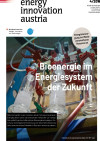
Energieversorgung auf Basis erneuerbarer Ressourcen.
energy innovation austria
4/2019
Herausgeber: BMVIT und Klima- und Energiefonds
Deutsch, 12 Seiten
Downloads zur Publikation
Innovative Stadtbegrünungstechnologien
Grüne Infrastruktur sorgt nicht nur für einen Kühleffekt, sondern erhöht gleichzeitig die Lebensqualität, die Biodiversität und das Wohlbefinden. Das Phänomen der Urban Heat Islands, welche den Anstieg der Temperaturen im Stadtgebiet aufgrund des Wärmeinsel-Effekts beschreiben, und die Zahl an Tropennächten während der Sommermonate, in denen die Luft nicht unter 20 Grad abkühlt, werden durch den globalen Klimawandel zunehmen. Städtebauliche und gebäudeintegrierte Maßnahmen sollen diesen Entwicklungen entgegengesetzt werden. Dabei stellen Begrünungen einen wichtigen Baustein einer dynamisch reagierenden, energetisch effizienten und klimatisch ausgleichenden Gebäudehülle dar.
Stadt der Zukunft Themenworkshop: Innovative Begrünungstechnologien - Klimawandelanpassung in der Stadt
30. Juli 2020
BMK, Radetzkystraße 2, 1030 Wien und Online-Teilnahme
Rund 40 TeilnehmerInnen vor Ort und über 130 Online-TeilnehmerInnen diskutierten über innovative Begrünungstechnologien und Möglichkeiten zur Klimawandelanpassung in der Stadt. Der neue Imagefilm über die Aktivitäten des Innovationslabors GRÜNSTATTGRAU sowie Projektergebnisse aus dem Forschungsprogramm Stadt der Zukunft wurden vorgestellt.
Mission Innovation Austria Online Event: Energy Communities - Die Rolle zukünftiger Energiegemeinschaften bei der Transformation des industriellen Energiesystems
17. Juni 2020
Online
Beim 4. MIA Online Event am 17. Juni 2020 wurde die Rolle der Industrie in der Transformation des Energiesystems beleuchtet. Welchen Beitrag können die Unternehmen hinsichtlich des Einsatzes Erneuerbarer Energien leisten? Sind Effizienzsteigerungen noch möglich? Welche Erfahrungen haben Industrieunternehmen mit Energiegemeinschaften gemacht? Und welche Auswirkungen sind für die Energiesysteme und -netze zu erwarten? Diese und mehr Fragen wurden beim Event diskutiert.
Weiterführende Untersuchungen und Monitoring der grünen Wände am GRG7 Kandlgasse
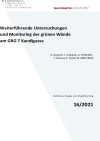
Anknüpfend an das abgeschlossene Forschungsprojekt „GrünPlusSchule“, in dessen Rahmen verschiedene Begrünungsmaßnahmen an und in einer Schule im 7. Wiener Gemeindebezirk (GRG7) umgesetzt werden konnten, greift das vorliegende Folgeprojekt weitere offene Fragen auf und widmet sich detaillierten Messdatenauswertungen zu den Auswirkungen der Innen- sowie Außenbegrünungen.
Schriftenreihe
16/2021
A. Korjenic, J. Hollands, A. Pichlhöfer, T. Gonaus, E. Sesto, M. Mitterböck
Herausgeber: BMK
Deutsch, 98 Seiten
Downloads zur Publikation
Digitization in the construction and real estate industry
In the multitude of digital possibilities, it is very difficult to maintain an overview, to assess trends and potentials, and to recognize correlations. This report therefore aims to describe the current state of the art and the market assessment of promising digital technologies. Information is provided on concrete use cases, added value and challenges of the respective technologies. The analyses presented serve to assess the potential and set the strategic course for the integration of the currently most important digital technologies in the construction and real estate industry.
Innovationen für Energiegemeinschaften
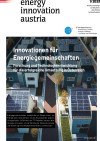
Forschung und Technologieentwicklung für die erfolgreiche Umsetzung in Österreich
energy innovation austria
1/2023
Herausgeber: BMK gemeinsam mit dem Klima- und Energiefonds
Deutsch, 12 Seiten
Downloads zur Publikation
Webinar: Regulatory Sandboxes als neues Instrument für nachhaltiges Bauen und Sanieren
24. Juni 2024, 16.00 – 17.30 Uhr
Online via Zoom
Wie können Regulatory Sandboxes dazu beitragen, Spannungsfelder im Bereich des nachhaltigen Bauens zu adressieren - vom Holzbau über die Verminderung des Flächenverbrauchs bis hin zum Einsatz von Künstlicher Intelligenz? Ergebnispräsentation des Forschungsprojekts „Green Sandbox Builder".
Film-DVD: Bauen für die Stadt der Zukunft

Dauer: 50 Minuten
Gestaltung: Claudia und Peter Giczy nach einer Idee von Michael Paula
Mehrsprachig
Zertifizierung von Siedlungen / Quartieren
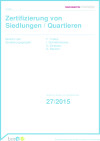
Sondierungsprojekt zur Übertragbarkeit des Schweizer Systems der 2000-Watt Arealbewertung auf Österreich
Schriftenreihe
27/2015
F. Trebut, I. Schrattenecker, H. Strasser, D. Bischof
Herausgeber: BMVIT, BMLFUW
Deutsch, 55 Seiten
Downloads zur Publikation
Europäischer Kongress über die Nutzung, Bewirtschaftung und Erhaltung von historisch bedeutenden Gebäuden
20. – 21. Oktober 2016
Hofburg Wien
Die Burghauptmannschaft Österreich veranstaltet heuer zum 5. Mal den Europäischen Kongress. Thema ist die Finanzierung von Projekten in historischen Gebäuden.
Innovative Konzepte zur Versorgung großvolumiger städtischer Gebäude/Quartiere mit PV und Geothermie
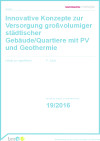
Schriftenreihe
19/2016
F. Zach
Herausgeber: BMVIT
Deutsch, 83 Seiten
Downloads zur Publikation
Österreichische Massivbaustoffherstellung: Impulsgeber für Regionen
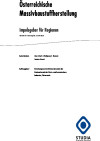
Analyse sozial- und regionalwirtschaftlicher Effekte österreichischer Werksstandorte
Wolfgang E. Baaske, Sandra Kranzl
Deutsch, 80 Seiten
Downloads zur Publikation
Innovationen für die Stadt der Zukunft
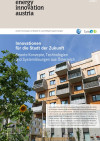
Smarte Konzepte, Technologien und Systemlösungen aus Österreich
energy innovation austria
4/2016
Herausgeber: BMVIT und Klima- und Energiefonds
Deutsch, 16 Seiten
Downloads zur Publikation
Internationale Passivhaustagung 2018
9. - 10. März 2018
München
Passivhaus - das lohnt sich! - So lautet der Slogan der 22. Internationalen Passivhaustagung. Der Schwerpunkt diesmal liegt auf der Vereinbarkeit von Effizienz und Wirtschaftlichkeit.
Stadt der Zukunft - 3. Ausschreibung gestartet
Die 3. Ausschreibung des Forschungs- und Technologieprogramms "Stadt der Zukunft" wird bis 28. Jänner 2016, 12:00 Uhr, geöffnet sein. Das Programm strebt die Erforschung und Entwicklung von neuen Technologien, technologischen (Teil-)Systemen und urbanen Dienstleistungen für die Stadt der Zukunft an.
Speicherintegration ins Büro(Office)gebäude FutureBase (SPIN.OFF)
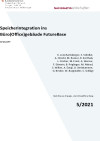
Im vorliegenden Projektvorhaben wurde in ein - in Planung befindliches - Bürogebäude ein Zink-Bromid Redox Flow Batteriespeicher integriert. Anhand dieser Demonstrationsanlage können Fragen, die bei der Integration und dem Betrieb von Batteriespeichern in gewerblichen oder öffentlichen Gebäuden auftreten, beantwortet werden.
Schriftenreihe
5/2021
K. Leonhartsberger, S. Schidler, A. Hirschl, M. Rosner, R. Korthals, L. Fischer, M. Ernst, A. Werner, F. Ettwein, B. Priglinger, M. Meisel, S. Wilker, A. Estaji, O. Stelzhammer, G. Becker, W. Burgstaller, S. Schlägl
Herausgeber: BMK
Deutsch, 139 Seiten
Downloads zur Publikation
Projekt CityStore Abschluss-Webinar
15. April 2021
Online, Wien, AT
Im Rahmen dieses Abschluss-Webinars möchten wir die Ergebnisse des Projektes einem interessierten Publikum präsentieren und einen Ausblick auf weitere Forschungsaktivitäten für die Nutzung städtischer Energiespeicher (elektrisch und thermisch) geben.
Digital transformation of the Austrian construction industry and its impact on employment
What are the impacts of the digital transformation of the Austrian construction industry on this sector’s labour market? By looking at the next five to ten years it will be analysed whether and to what extent digital applications lead to an increasing, falling or stagnant demand for employees in the construction industry and in construction occupations.
Startups in Energy Transition "Reverse Pitch"
30. September 2021, 13:00 - 17:00 Uhr
Bundesministerium für Klimaschutz, Radetzkystraße 2, 1030 Wien (onsite, hybrid, online – abhängig von der aktuellen Lage)
Was Startups schon immer von der Forschung wissen wollten
